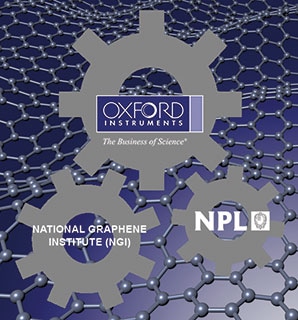Oxford Instruments announces the launch of a new collaborative project with the United Kingdom’s National Physical Laboratory (NPL) and the National Graphene Institute (NGI, based at the University of Manchester, UK), partially funded by the Innovate UK for development of a commercial measurement system for nanotechnology applications.

This important collaboration will be led by Oxford Instruments and the proposed turnkey system will be developed at the company’s Tubney Woods, UK site. The measurement system will be operating at cryogen free low magnetic fields and will enable primary resistance calibrations with unprecedented accuracies to be used by national metrology laboratories and industrial companies. The system will reduce operational costs, save time and complexity.
“Oxford Instruments is determined to provide our customers and partners with state-of-the-art tools and solutions for nanoscience and nanotechnology applications. Working with leading graphene researchers at NGI and metrology specialists at NPL, Oxford Instruments will bring this smart material to the factory floor and science laboratories. This will accelerate commercial applications of graphene’s use in standard measurements and 2D materials characterisation”, said Dr Ziad Melhem, Alliances Manager at Oxford Instruments NanoScience.
Graphene is a revolutionary, two-dimensional (2D), atomic scale carbon material with unmatched properties and is expected to revolutionise industry and consumer products over the coming years. Demand for accurate measurements at the nanoscale will continue to increase and the graphene-enabled quantum resistance system will provide the high-end electronics instrumentation industry with a primary resistance standard for the first time. The system is intended to be used directly on the factory floor, dramatically reducing the calibration traceability chain and improving the precision of electronics instrumentation. The quantum Hall effect (QHE) is one of the most fundamental phenomena in solid-state physics and its observation in graphene is facilitating a new class of electrical metrology tools.
UK has been a global leader in research on graphene since it was discovered at the University of Manchester and supported by over £80 million funding from the UK government. Innovate UK and the Engineering and Physical Sciences Research Council (EPSRC) are investing an additional £2.5 million in technical feasibility studies to target the applications of graphene with the greatest commercial potential. Oxford Instruments NanoScience, NPL and NGI were awarded a grant from Innovate UK, to test the operation of a turn-key quantum Hall system in industrial environment.
In the previous decade we have demonstrated that graphene is the best ever material for realising the quantum Hall effect and that it is ideally suited for resistance calibrations. The challenge of the present exciting UK Innovate project is to take this research and turn it into a real-life application which can be used on the factory floor where it is needed, outside highly specialised laboratories like NPL. If we succeed in this, many more people can use it or use the system to characterise their own graphene.
Dr JT Janssen, Head of Science at NPL
Professor Vladimir Falko, Director of NGI at Manchester University said, “Graphene-based quantum resistance standard device is going to be a unique example of how blue-sky science finds its way into commercial applications specifically due to its fundamental nature. I am proud of this work, initially funded by the European Commission is now, on the track to deliver a practical tool for the metrology services worldwide.”